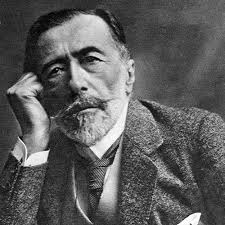Review: Heart of Darkness
This novel, by Joseph Conrad, is one of the books I haven’t read on the list of 100 best novels in English. (I’m now down to just a handful.)

Joseph Conrad
The Biography website says this about Conrad: “Joseph Conrad was born Józef Teodor Konrad Korzeniowski on December 3, 1857, in Berdychiv, Ukraine. His parents, Apollo and Evelina Korzeniowski, were members of the Polish noble class. They were also Polish patriots who conspired against oppressive Russian rule; as a consequence, they were arrested and sent to live in the Russian province of Vologda with their 4-year-old son. When Conrad’s parents died several years later, he was raised by an uncle in Poland.
Conrad’s education was erratic. He was first tutored by his literary father, then attended school in Krakow and received further private schooling. At the age of 16, Conrad left Poland and traveled to the port city of Marseilles, France, where he began his years as a mariner.
Seafaring YearsThrough an introduction to a merchant who was a friend of his uncle, Conrad sailed on several French commercial ships, first as an apprentice and then as a steward. He traveled to the West Indies and South America, and he may have participated in international gun-smuggling.
After a period of debt and a failed suicide attempt, Conrad joined the British merchant marines, where he was employed for 16 years. He rose in rank and became a British citizen, and his voyages around the world—he sailed to India, Singapore, Australia and Africa—gave him experiences that he would later reinterpret in his fiction.
Literary CareerAfter his seafaring years, Conrad began to put down roots on land. In 1896, he married Jessie Emmeline George, daughter of a bookseller; they had two sons. He also had friendships with prominent writers such as John Galsworthy, Ford Madox Ford and H. G. Wells.
Conrad began his own literary career in 1895 with the publication of his first novel, Almayer’s Folly, an adventure tale set in the Borneo jungles. Before the turn of the century, he wrote two of his most famous and enduring novels. Lord Jim (1900) is the story of an outcast young sailor who comes to terms with his past acts of cowardice and eventually becomes the leader of a small South Seas country. Heart of Darkness (1902) is a novella describing a British man’s journey deep into the Congo of Africa, where he encounters the cruel and mysterious Kurtz, a European trader who has established himself as a ruler of the native people there.
Later LifeOver the last two decades of his life, Conrad produced more autobiographical writings and novels, including The Arrow of Gold and The Rescue. His final novel, The Rover, was published in 1923. Conrad died of a heart attack on August 3, 1924, at his home in Canterbury, England.
Conrad’s work influenced numerous later 20th century writers, from T. S. Eliot and Graham Greene to Virginia Woolf and William Faulkner. His books have been translated into dozens of languages and are still taught in schools and universities.”
This novella – it is only 99 pages – was first published in 1902 and is set at the end of the 19th century. Conrad actually sailed up the River Congo in 1890. There are two principal characters. Marlow, the narrator, an able seaman who is waiting for the tide to turn in the River Thames, and Kurtz, an agent of a Belgian company, who has become incommunicado in the interior of the Congo Free State. Marlow tells the story of his employment by a French company to be the captain of a steam river ferry. When Marlow arrives in the Congo, he is appalled by the racism and the laziness of the white colonists. The blacks seem indifferent to their mistreatment. The colonial managers are largely in awe of the remote Kurtz, who espouses unrevealed, complex theories about life. He is worshiped – almost as a deity – by the native people. Much of the book describes the jungle through which the steamer passes on its way to find Kurtz. The darkness of the jungle is similar to the darkness and remoteness of the blacks, to the immorality of the colonists and human nature in general. Marlow finds Kurtz, who dies. At the end of the novella, Marlow meets Kurtz’ fiancée, who speaks highly of him. Marlow decides not the tell her his impression of Kurtz.
This book is a vivid depiction of the colonisation of the Congo under the direction of King Leopold II of Belgium: cruel, inefficient and ineffective. Conrad uses a first person narrator to convey human consciousness vividly, and he uses different characters to express divergent opinions about a vital issue.



